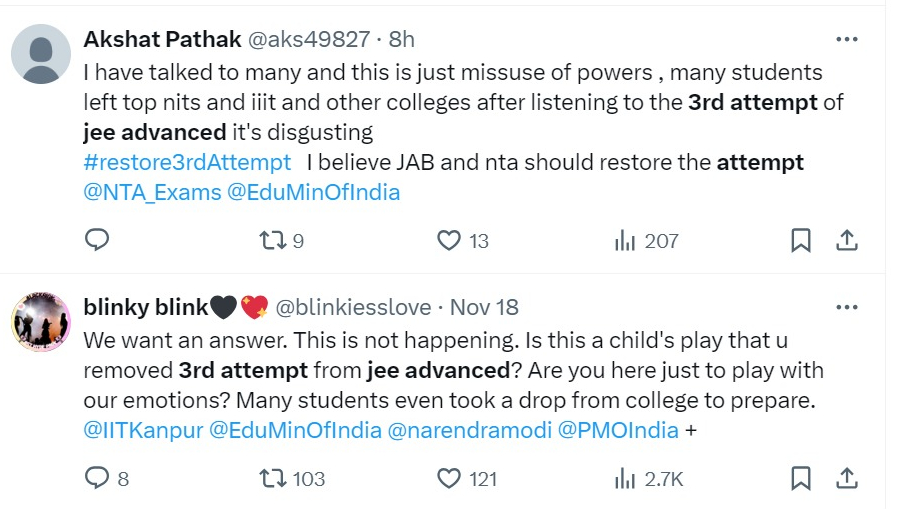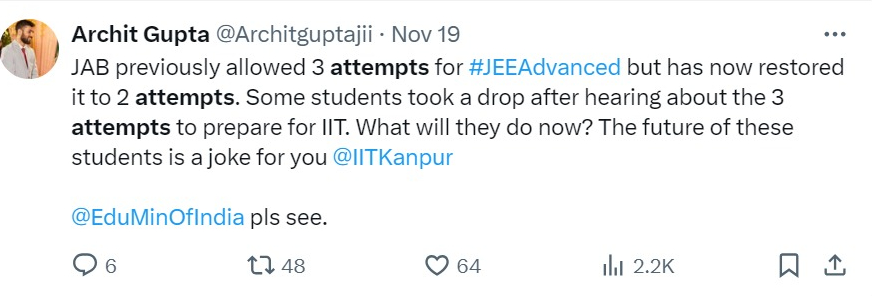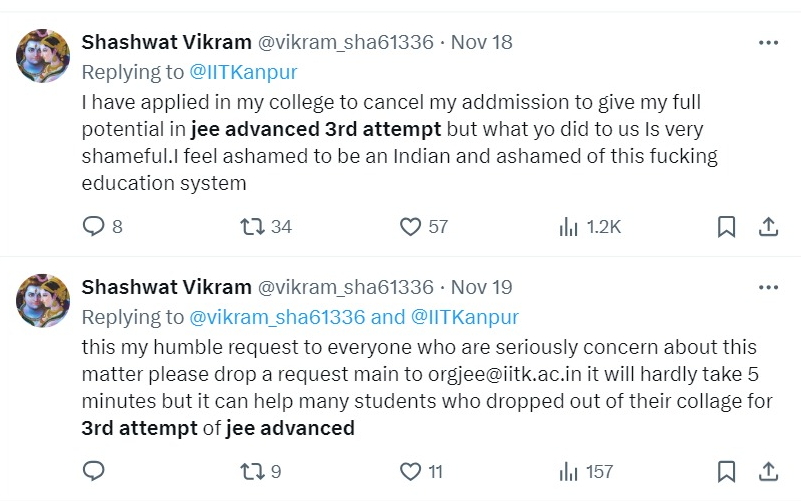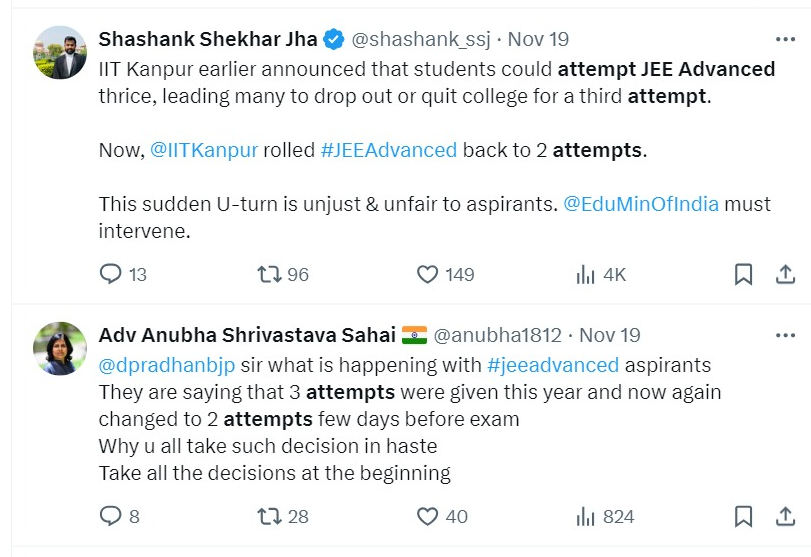JEE Advanced 2025: #Restore3rdAttempt Trends on X; Students Urge JAB to Reinstate Three Attempt Limit
The reversal of the JEE Advanced attempt limit from three to two attempts has caused a frenzy among students, who have taken to X to express their disappointment. Learn more below.
Students are rallying on X with #Restore3rdAttempt in response to JAB's reversal of the JEE Advanced attempt limit decision. Initially, on November 5, it was announced that starting in 2025, students would have three consecutive attempts at the JEE Advanced exam. However, on November 18, JAB reverted this decision, reducing the attempt limit back to two consecutive years.
This decision has caused significant agitation among the student community, who were hopeful for an additional chance to attempt the JEE Advanced exam and secure IIT admission. Many students who had exhausted their two attempts in 2023 and 2024 were looking forward to taking the exam in 2025 after the three-attempt decision was announced. Reports indicate that several students even left their NIT seats, planning to apply for JEE Advanced 2025 and aim for IIT admissions in the 2025-26 session.
#Restore3rdAttempt and #JEEAdvanced3rdAttempt on X Trends
Candidates have taken to X, tagging PM Narendra Modi, the Education Ministry of India, and IIT Kanpur to express their disappointment. They are demanding an explanation for JAB's recent decision to roll back the attempt limit, which was announced just a few days ago.
An X user wrote "Honourable @ narendramodi ji! Students who were initially allowed 3 attempts for #JEEAdvanced2025 are now being restricted to just 2 attempts without explanation. This sudden change crushes their hopes & dreams! #Restore3rdAttempt #JEEAdvanced3rdAttempt".
More users have joined in this conversation:
Apart from the change in the attempt limit for JEE Advanced 2025, all other eligibility criteria remain the same. Candidates must qualify the JEE Main exam and rank among the top 2,50,000. They should have passed their Class 12 examination or equivalent either in the previous year or the current year. Additionally, there are age restrictions: general category candidates must be born on or after October 1, 2000, with a five-year relaxation for SC, ST, and PwD candidates.
IIT Kanpur has updated the JEE Advanced 2025 official website. The JEE Advanced 2025 eligibility and syllabus have been updated on the website. the exam date and other details are yet to be announced.
Read More:
- JEE Advanced 3rd Attempt Removed: Know Implications on IIT Aspirants
- JEE Main 2025 Registration Last Date Tomorrow; Correction Window To Open on November 26
- GATE 2025 Application Form Correction for PwD Applicants Closes Tomorrow
| Explore important events of JEE Advanced | |||
|---|---|---|---|
| Syllabus | Dates | Eligibility | Pattern |
Q: What is the JEE Advanced exam pattern?
Q: How do the exam patterns and formats of JEE Main and JEE Advanced compare?
JEE Main and JEE Advanced are both national-level entrance exams conducted for admission to undergraduate engineering programs in India. While JEE Main is the first stage of the Joint Entrance Examination (JEE) and is conducted by the National Testing Agency NTA JEE Advanced is the second stage of the exam and is conducted by one of the seven Indian Institutes of Technology (IITs) on a rotational basis.
Here are the key differences between the exam patterns and formats of JEE Main and JEE Advanced:
- Number of Papers: JEE Main has two papers - Paper 1 for admission to B.E. /B.Tech courses and Paper 2 for admission to B.Arch/B.Planning courses. On the other hand, JEE Advanced has two papers - Paper 1 and Paper 2, both of which are mandatory.
- Exam Mode: JEE Main is conducted in both online (Computer Based Test) and offline (Pen and Paper Based Test) modes, while JEE Advanced is conducted only in online mode.
- Question Types: Both exams have multiple-choice questions (MCQs) and numerical answer type questions (NATs), where students have to enter the answer in numerical form.
- Difficulty Level: JEE Main is generally considered easier than JEE Advanced in terms of difficulty level.
- Syllabus: The syllabus for both exams is similar, but JEE Advanced includes a few additional topics and also requires a deeper understanding of the concepts.
Q: What are the important chapters in JEE Mains and JEE Advance that give up to 80% of marks?
Follow Shiksha.com for latest education news in detail on Exam Results, Dates, Admit Cards, & Schedules, Colleges & Universities news related to Admissions & Courses, Board exams, Scholarships, Careers, Education Events, New education policies & Regulations.
To get in touch with Shiksha news team, please write to us at news@shiksha.com

Mamona is an accomplished author with 6 and counting years of expertise in education-based content creation. Armed with an MA (Hons) in Advertising and Public Relations, complemented by a BA (Hons) in Journalism and... Read Full Bio
Latest News
Next Story




